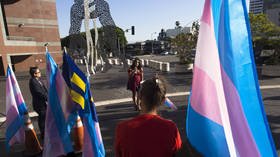How the woke’s war on words took over 2021

For more than two decades, language has been the most important terrain on which the culture war has been fought. But in 2021, the policing of words gained unprecedented momentum to reach nonsensical levels.
2021 was the year of “You can’t say that”.
I have stopped counting the number of words that we are no longer allowed to use, as well as the newly invented terms that linguistic crusaders have attempted to shove down our throats.
Historically, the promotion of what used to be called ‘politically correct language’ was associated with the activities of campaigning groups who sought to weaponise words to draw attention to their cause. But in 2021, the advocacy of a new woke vocabulary was no longer the monopoly of campus radicals and identity politics-driven campaigners. Government officials, heads of the civil service and various cultural institutions, and even the courts were busy lecturing the public about what words can and cannot be used.
In Britain, for example, judges were told to stop using the word ‘postmen’ and instead embrace the term ‘postal operatives’. The recently revised Equal Treatment Bench Book, issued in December by the Judicial College, is devoted to the objective of ensuring that the courts embrace a gender-neutral language. Judges were also instructed to use the preferred personal pronouns of transgender people.
The involvement of the courts and the system of criminal justice in the project of linguistic policing has an important symbolic significance. It legitimates linguistic engineering, and endows the vocabulary of wokeness with respectability.
In 2021, we saw the legal and political establishment continually fiddling with language to gain support for their policies. As one British doctor tweeted, “I’ve just been on Sky News explaining that the media and others need to stop calling public health measures ‘restrictions’. They’re there to protect the vulnerable people in our society, who matter just as much as anyone else.”
Her demand to stop referring to government restrictions on people’s lives as ‘restrictions’ can be interpreted as a call for inventing a new Orwellian term – ‘protections’.
In December, the Welsh government was busy re-engineering its official vocabulary. In its wisdom, it decided to ban its civil servants from using the word ‘Brexit’. This was to be replaced by the snappy phrase the “transition period to refer to the time between February 1 and December 31, 2020”. For reasons best known to itself, the Welsh Government also decreed that its staff should say ‘non-disabled’ rather than ‘able-bodied’. And only a few days before eradicating Brexit from the vocabulary of officialdom, ministers decided to cancel ‘men’ and ‘women’ from sex education in Wales.
At the same time, officials in the UK government’s Cabinet Office were busy drawing up plans to eliminate ‘Christmas’ from public discourse. They claimed that use of the term excludes members of the public who do not celebrate this holiday.
Civil servants who regard inclusion as a quasi-religious article of faith sought to block the slogan “Don’t take Covid home for Christmas” and replace it with “Don’t take Covid home for the holidays”. Fortunately, at least on this matter, sanity was restored and Christmas was saved.
But there has been a veritable crusade afoot to de-Christianise public conversation. The European Union’s guide on inclusive communication was clearly committed to disassociating Europe from its Christian tradition. “Not everyone celebrates the Christian holidays, and not all Christians celebrate them on the same dates,” observed the guide. It advised EU employees to avoid sentences such as “Christmas time can be stressful” and instead use “Holiday times can be stressful”.
The guideline warned against the usage of the phrase ‘Christian names’ and said to use ‘first name’ or ‘forename’ instead, as well as not using names “that are typically from one religion.” It gives the example of using “Malika and Julio” instead of “Maria and John” to describe an “international couple.”
Arguably the greatest success achieved by the language police was to gain the support of public and private institutions for adopting the vocabulary of transgenderism. Even institutions like Britain’s Ministry of Defence have fallen prey to transgenderist ideology. MoD staff are advised to be careful about using the word
‘female’ in case it offends members of the trans community. Staff working for the MoD have also been encouraged to publicise their preferred pronouns.
2021 will also be remembered as the year when the term ‘women’ became the target of a vicious campaign. Sir Keir Starmer, the leader of the UK’s Labour Party, personified the Orwellian turn of gender-related language when he declared on the BBC’s ‘Andrew Marr Show’ that it is wrong to say “only women have a cervix”.
The medical establishment rushed in to use woke language to deny the biological difference between males and females. One of the most outrageous examples of the re-engineering of language was when the leading medical journal, the Lancet, decided to refer to women as “bodies with vaginas”. This ridiculous term joined a long list of recently fabricated words like ‘chestfeeding’ and ‘pregnant people’. Just to create even more confusion, maternity departments in some hospitals have been rebranded as ‘perinatal services’.
The ceaseless attempt to re-engineer the language we use has even caught some of the supporters of this project unaware. As one sympathetic New York Timescommentator reported, “In Chicago, Kelsey O’Donnell, 31, wonders why colleagues and friends have suddenly started saying ‘BIPOC’, an acronym that encompasses individuals who are Black, Indigenous or other people of color. Where had it come from? ‘There was really nobody to ask,’ says Ms. O’Donnell, who is white. ‘It was just, ‘This is what we say now.’’”
When someone reacts to words that appear from nowhere with the response “this is what we say now,” it becomes evident that they are under tremendous cultural pressure to uncritically adopt a new language.
That freedom of speech and public life are in serious trouble in the Anglo-American world is illustrated by its apparent inability to prevent the debasement of its language.
Yet the woke language police can be defeated. All we need is more of us to react to the exhortation “You can’t say that” by declaring “Yes we can”. Act now, otherwise you will be eating BIPOC for breakfast.
The statements, views and opinions expressed in this column are solely those of the author and do not necessarily represent those of RT.















